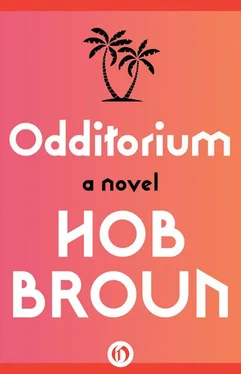“Softball. It’s softball. And you’ll pick it up real fast, I know you will. First practice is next week.”
“Sorry. I’ve got a gig in Daytona Beach next week. Jerry’s Gondola, remember?”
“I canceled it.”
There was an argument about that. Tildy threw half a dozen cocktail glasses overboard. But eventually her energy was exhausted and she stood by the mahogany railing, spitting into the water.
“Come on, it’s crazy to fight. What a beautiful day this is. Let’s fish a little.”
Sparn handed her a rod fitted with a large saltwater reel. She looked at it for a moment, then handed it back to him.
“You fish, Pete. I’ll cut bait.”
Tildy chewed ice and looked out the window to avoid watching Sparn eat. A little boy in the parking lot was writing on the side of someone’s car with a piece of charcoal. The car had two flat tires and a blotch of body putty near the door. She knocked on the glass and waved to him, but he went on writing.
When Sparn had picked over the bones, sopped up the last of the grits and egg yolk, he loosened his belt and reached for a toothpick.
“More water?”
“I’m fine.”
“Not much to say for yourself this morning. Something bothering you?”
Tildy rolled the icy glass across her forehead. “Just a little drumming behind the eyes.”
“I don’t know. Seems to me like everybody’s cranky and depressed. What is it — all you girls on the rag at once?”
“We’re tired, wasted. That’s all.”
“I don’t know. The team is flat as hell. They’re bitching, they’re dragging their feet. I thought you might know something that’s going on. Sometimes — this is going to sound strange, but sometimes I wake up at night with a feeling like the whole operation is coming apart and I don’t even know who to blame. You’ve been around since the start, Tildy. What do you think I should do?”
“You want my advice?”
Sparn nodded earnestly.
“Go home.”
On the evidence, Coffeyville was a town with either tremendous civic pride or nothing else to do. An SRO mob had assembled to cheer and stomp for their team, eight members of the Rotary Club and someone’s teenage son. The town supervisor was on hand distributing free ball-point pens advertising his aluminum siding business and his sister had brought her kindergarten class, complete with construction paper name tags. A man in a derby and sleeve garters blew cavalry charges on a dented bugle. A squad of young housewives paraded with homemade signs.
Vinnie was selling an awful lot of beer. Every few minutes a roving Sparn, too worked up to sit still, stopped to pound him on the back or tousle his hair. It was starting to look as though they would be able to clear the entire week’s nut off this one show; he was once again Big Pete, the jaunty sportsman, and could dismiss as illusory the image that had possessed him only a few hours earlier, of his Cougarettes sinking into chaos and eventual bankruptcy. On his head at a debonair angle was the gold cap with the big green C.
Although the Cougarettes, powered by two doubles from M.J. in the cleanup spot, were leading 3–0, and the Rotarians had managed but two harmless singles, the Coffeyville crowd maintained its feverish noise level. They were not too partisan, however, to applaud the outrageous play Tildy made to end the sixth inning, a diving stab behind the bag and a snap throw from one knee that beat the runner by a step and a half. But the Coffeyville folks refused to cave in. When they went down in the eighth on two strikeouts and an infield pop-up and the bugle man started to play taps, a fat lady sitting behind him knocked off his derby. Tildy got on on an error in the top of the ninth, stole second and then third on successive pitches. Sparn lit up a victory cigar and Heidi hit a line drive right at the third baseman to end it.
They were all on their feet for the home ninth, clapping rhythmically and whistling. They stayed there when Flora walked the leadoff man on four pitches, then came inside on the next batter and plunked him in the ribs. M.J. called time and went to the mound for a conference. Tildy saw Flora slowly shake her head and point to herself. Flora’s next delivery sailed over everyone’s heads and the runners advanced.
Ben Salem peeled off his mask and looked at the stands for guidance, but Sparn was dreamily blowing smoke rings and stroking the bill of his cap. The next two weren’t even close and there was no way he could call them strikes. The crowd noise remained at a roar as Flora cut the heart of the plate twice for a three-two count. Then she bounced one in the dirt to load the bases. And suddenly Tildy realized what was going to happen.
Coming up next was the kid, who had not had so much as a loud foul off Flora all day long. The other girls slapped their gloves and yelled encouragement, barely audible against the swelling clamor of Coffeyville.
“On the money, baby, on the money.”
“Forget it, batter. School’s out.”
“You git him, big F. Way to shoot, way to chuck.”
But Tildy stood with arms loose at her sides, watching, waiting.
The kid was scared, knew he was going to hit into a double play. He plucked at his uniform, spat on his hands, anything to buy a little time. Finally he stepped in. Flora served him a big, juicy lollipop and he slammed it over the fence to end the game.
With a thin smile on her lips and a knot in her chest like a cold hunk of quartz, Flora jogged over and found Sparn pallid and wide-eyed among the jubilant yokels.
“I tried to let up for you, Mr. Sparn,” she said. “Was it dramatic enough?”
Fighting his way out of the crush, Sparn stumbled dizzily to the shelter of an oak tree and deposited his breakfast all over its roots.
One hour later he installed Ben Salem as the Cougarettes’ new manager.
Then he went home.
FOR THE FIRST TIME in several days, sunlight came blaring through the open blinds, turning everything a rancid yellow, heating a broth of bad smells. Inmates were scattered about the dayroom, some on folding chairs, some on the floor, trying to digest their breakfast of creamed hamburger on toast. They were for the most part too heavily medicated to focus on the television. An interview show was on; a woman was discussing her book on healing through self-hypnosis.
A skinny kid with bruised lips, a new arrival taking only Tofranil, pointed at the blue screen. “Been in a trance all my life, dolly. That’s what got me in here.”
Oodles, who had been committed by his daughter over the Christmas holidays, was nodded out in his chair. Skeeziks, who had been in the longest, so rumor had it, nibbled a jujube of earwax. His skin was grayish-yellow against the green hospital gown. He sat at attention, arms held rigid in front of him; every few seconds his tongue, chalky and cracked, slithered out in a fly-catcher movement. Skeeziks was exhibiting symptoms of tardive dyskinesia, a common side effect of a prolonged diet of tranquilizers from the phenothiazine group. Boots Malone, a two-year man, was encountering the same syndrome. He stood facing the wall, drenched in sweat, his hands shaking with palsy.
“Bootsie’s not looking too good today,” said Harris, lighting one cigarette from the end of another. He liked to smoke his entire ration before lunch, then beg the rest of the day.
“No wonder,” said Mikie. Mikie weighed 230 pounds and had lost most of his hair by age twenty-eight. “I saw at breakfast. They give him two of those orange bombers, you know. That’s almost half a gram.”
“Half a gram? Oh, my Lord.” Harris tapped ashes onto the back of his hand, smeared them into the shape of a cross. “They’re gonna make an eggplant out of him.”
Читать дальше












